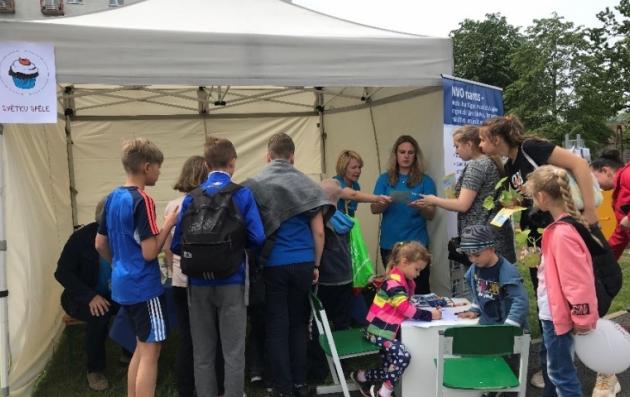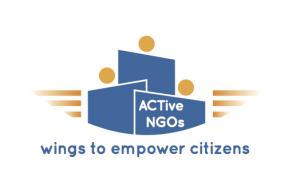Date of label : 02/06/2017
-
Riga , Latvia
-
Size of city : 641.007 inhabitants
Previously transferred

Summary
To respond to the lack of coordination and communication among the many social organisation in Riga, the NGO offers a new model of civic-ecosystem creation. Operating since 2013, the NGO House is the virtual and physical space of collaboration and support for non-governmental organisations, and the place where volunteers, representatives of NGOs and citizens can engage in socio-cultural activities, learn, explore and create.
The solutions offered by the good practice
The solutions offered by the Riga good practice are oriented towards the creation of a democratic and inclusive society based on solidarity, sustainability and equal access to civil, social, economic and cultural rights. While the idea of a hub for civic oriented organisations was born in 2010 for the capital city of Latvia, it is in September 2013 that the Riga City Council established the NGO House. The scope is to address the challenges of participation in the activities of the municipality, to achieve social integration for people of different ages, social groups and nationalities, by supporting NGOs promoting citizens' awareness of local affairs. The Riga NGO House is a platform for cooperation , but also a physical space located in a five-storey high white brick building in one of the neighbourhoods of Riga, 20 minutes ride away from the city centre. The place is meant for meeting among organisations to receive educational, technical, administrative and information support. The NGO House is a place for organising informative and practical seminars for the representatives of NGOs for free, offering an opportunity to get new, useful knowledge on various topics, important for the operation and development of NGOs. Furthermost The NGO House organises events, thematic talks to address current societal issues and challenges.
Building on the sustainable and integrated approach
European cities have committed themselves to providing integrated and quality services and cooperation possibilities for citizens to ensure their active integration into society. The cities adapt to citizens’ expectations and needs and not vice versa. Targeted and appropriate investment in urban integration, participation and social inclusion processes will result in economic and social betterment. The founding and operation of the Riga NGO House is based on a participatory approach. The cooperation model of the Riga municipality, non-governmental organisations and citizens is focused on sustainable long-term activities, and the NGO House serves as a tool for this cooperation model. Members of NGOs are the most active part of society, bringing together people of all ages, professions and nationalities. NGOs help citizens to make their voices heard, express their creativity, represent and defend their interests. The role of the non-governmental sector in the development of civil society is growing alongside the support of the municipality for joint projects and activities. There's also increased participation of NGOs and citizens in implementing various municipal policies and proposals put forward by citizens. The founding and development of the NGO House demonstrate the interest of the Riga government in bilateral cooperation as it provides a significant long-term support system for NGOs' activities, henceforth a sustainable society and integration policy development direction.
Based on a participatory approach
The NGO House was set up at the request of the inhabitants of Riga. Organisations' needs are taken into account in the development of services, and the city conducts regular consultations. Since the opening of the NGO House, more than 47,000 people have visited it and attended the events organised by the NGO House or NGOs. In 2016 the number of visitors doubled compared with the first two years of operation. In the course of three years 140 NGOs have organised 2,920 events. Every year we witness the growth of the number of events: in 2014 there were 400 events, in 2015 830 events, and in 2016 1,690 events. Representatives of more than 500 organisations have participated in the events organised by organisations themselves or municipalities. Some 104 informative, educational seminars or practical workshops attended by representatives of more than 410 NGOs have been produced by NGO House staff as support measures. Twinning and networking events of 18 organisations drew more than 1,000 participants.
What difference has it made?
Through the participation in Active NGO, the city of Riga took the opportunity to expand the NGO House potentials beyond the physical walls of the House itself. Riga has 58 neighbourhoods and NGos are spread all over the city. Thanks to the Active NGO leadership, Riga could embark in an improvement plan that launched several actions of the “NGO House outside the House”. The scope was to reach out more people in a more capillary way in the entire city area. The partners in the network .( Siracusa IT, Santa Pola ES, Dubrovnik CR, Espoo FI and Brighton and Hove UK have been excellent advisors providing fresh new ideas. For instance, inspiring was the case of Brightong and Hove, with the initiative “Hawks Community Cafe” for informal meetings and the programme “Active Life”, with events offering possibilities of voluntary work or joint walks taken by the councillors and residents in the neighbourhood to highlight the issues that need to be solved within communities. As response Riga organised a similar events and other festivities in peripheral neighbourhood of Riga, reaching out places where the presence of community based activities was sporadic ( further info here). While operating I, the life time of the network Riga was able to organise also ad hoc seminars in project management, public speech, personal data protection directed to almost 600 NGO members, employees and volunteers. During the heights of the pandemics the NGO House practice resulted crucial in providing support to most in need and adapting their activities to this time of crisis.The NGO House became a point of contact, exchanging information and providing distance seminars to guide people in the digital environment with advices on how to reorganise work and private life . NGO House was closely cooperating with the voluntary movement “Stay Home” born in Latvia, which, by using technologies – an application with tasks and Hotline phone number, provides help to those most in need of it. The work was focused on providing help in e.g. delivering groceries and other purchases, taking pets for a walk, thus allowing people to stay at home.
Transferring the practice
Riga’s learning was supported by exchange visits in cities part of the network which contributed to expand the wealth of ideas and practice of the initial NGO House. These international visits brought together different members of the ULGs, allowing municipal officers and their civil counterparts to establish new connections and partnerships, thus strengthening their local ecosystems. In addition, Active NGO closely collaborated with Civic Estate and Comm.unity Lab Urban network for exchange of practices and knowledge sharing. In terms of transfer, the Riga NGO House is a specific model that is strongly rooted in its own local administrative, policy, economic and social environment. At the same time, the Transfer of learning from Riga’s NGO House and the local experiences of other partner cities could bring specific, custom-made knowledge to each municipality and local stakeholder group.The final outcome of the Network is in form of a book The Power of Civic Ecosystems based on the testimonies of the participating cities, enriched by case studies of other sister practices in cities all over Europe. .
-
260_Riga_Gpsummary.pdf(PDF, 140Ko)

